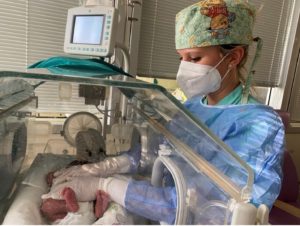The Importance of Developmental Care in Neonatology
Contributors: Gaia Dussi, RN, BSN, MSN, and Giada Ferrari, RN, BSN, MSN
Today, 1 June, is the Global Day of Parents. When their newborns are hospitalised, parents are understandably under a lot of stress and anxiety. During the COVID pandemic in north-east Italy, parents were not allowed to visit their babies in hospital. This is where nurses stepped in to ensure that Family-Centred Care, contact with parents and human touch continued despite the pandemic.

It is estimated that 15 million babies around the world are born prematurely every year (one out of 10 babies). In recent years, the mortality rate in preterm infants has been reduced by advanced perinatal care, but the developmental morbidity is still very high (Lui et al 2019). It is estimated that more than 25% of neonates born between the 28th and the 32nd week of gestation are affected by developmental disorders by the age of two years, and 40% present a certain degree of disability by the age of 10 (Johnston et al 2014), with the social and economic consequences that follow. Visual, auditive, tactile and painful stimulations are crucial for the normal process of maturation of brain functions. Therefore, each sensory experience causes a behavioural response in the baby’s brain, promoting further sensory experiences (Soleimani et al 2020).
However, preterm birth is associated with an immaturity of neuro-cognitive development. When the newborn has sensory experiences that are disproportionate to his developmental stage, its neurodevelopment will be different from when it is in the protective uterine environment. Thus, there are different neuro-behavioural outcomes between preterm and term infants (Altimier & Phillips 2016). The more immature the infant, the more vulnerable the brain.
Developmental Care is a set of behaviours and attitudes acting on different levels with the purpose of minimizing infant distress. It aims to improve the NICU environment, reduce painful stimulations, promote periods of sleep, and reduce periods of destabilization. Furthermore, it aims to promote neurobehavioral development by ensuring early contact with caregivers (Altimier & Phillips 2016).
The effectiveness of Developmental Care in Neonatal Intensive Care Units has been described in several studies. In premature infants, this approach can have positive effects on neuro-cognitive and psycho-motor development visible in the first 12 months of age (Soleimani et al 2020). Early Developmental Care interventions significantly improve cognitive outcomes (Spittle et al. 2015). A systematic review in 2019 (Padros & Hess 2020) investigated the benefits of Kangaroo Mother Care and Skin to Skin methods, concluding that they improve short-term cardiorespiratory stress outcomes, reduce cortisol and increase oxytocin levels. These strategies significantly reduce distress in the newborn. Developmental Care is an essential factor for high quality nursing care. NICU staff should train and encourage these behaviours and attitudes to achieve short- and long-term positive health outcomes.
Given the importance of Developmental Care, this approach has been adopted in the clinical practice of most Neonatal Intensive Care Units in north-eastern Italy, where multidisciplinary teams, composed of nurses with different sets of skills, work with preterm infants to ensure Family Centred Care, as an essential added value in clinical practice.
With the outbreak of the COVID-19 pandemic, the world of neonatology has undergone profound and structural changes due to the need to apply containment measures against the virus. For the first time in over 40 years, the access of parents to the NICU has had to be regulated. These measures could negatively affect the development of the parent-child bond. Therefore, nursing staff is being challenged in helping parents and babies establish their relationship and supporting mothers and fathers in difficulty. Nurses are essential to providing the contact and human touch that set the fundamental steps for the correct development of premature babies.
This pandemic has shown how important the Family Centred Care approach is for young patients and their families. It has also highlighted how much more can be done to make nursing care even more “preterm friendly”. During this period, we have found an alternative solution to reduce the distance between parents and their infants in NICU. Videocalls with parents were made daily by the staff to show them their babies and to inform them about their daily progresses.
The appreciation shown by parents for these gestures highlights the importance of the nursing profession in the care for premature babies. This gives us the strength to continue our work with passion and dedication, especially in this difficult moment.
Altimier L, Phillips R. (2016) The Neonatal Integrative Developmental Care Model: Advanced Clinical Applications of the Seven Core Measures for Neuroprotective Family-centered Developmental Care. Newborn and Infant Nursing Reviews. 2016;16(4):230–44.
Johnston KM, Gooch K, Korol E, Vo P, Eyawo O, Bradt P, et al. (2014) The economic burden of prematurity in Canada. BMC Pediatr. 2014;14:93.
Lui K, Lee SK, Kusuda S, Adams M, Vento M, Reichman B, et al. (2019) Trends in Outcomes for Neonates Born Very Preterm and Very Low Birth Weight in 11 High-Income Countries. The Journal of Pediatrics. 2019;215:32-40.e14.
Pados BF, Hess F. (2020) Systematic Review of the Effects of Skin-to-Skin Care on Short-Term Physiologic Stress Outcomes in Preterm Infants in the Neonatal Intensive Care Unit: Advances in Neonatal Care. 2020;20(1):48–58
Soleimani F, Azari N, Ghiasvand H, Shahrokhi A, Rahmani N, Fatollahierad S. (2020) Do NICU developmental care improve cognitive and motor outcomes for preterm infants? A systematic review and meta-analysis. BMC Pediatr. 2020;20(1):67.
Spittle A, Orton J, Anderson PJ, Boyd R, Doyle LW. (2015) Early developmental intervention programmes provided post hospital discharge to prevent motor and cognitive impairment in preterm infants. Cochrane Neonatal Group. Cochrane Database of Systematic Reviews. Available at: http://doi.wiley.com/10.1002/14651858.CD005495.pub4

